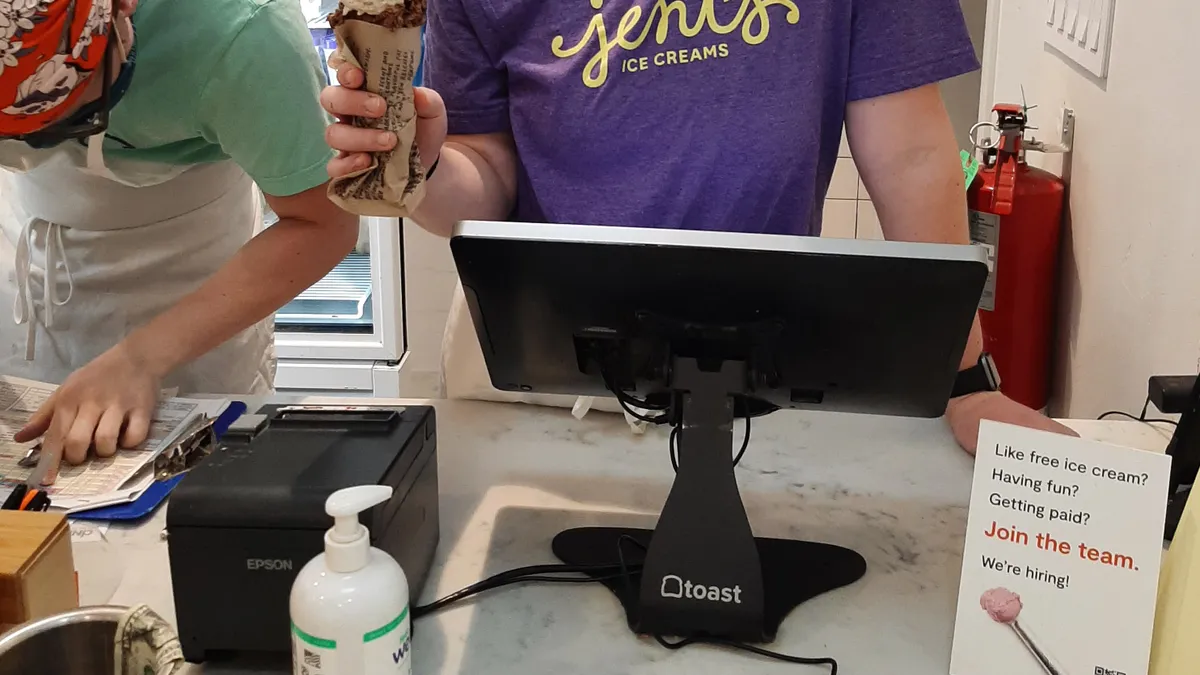Dive Brief:
- Restaurant point-of-sale software provider Toast hasn’t experienced restaurant client churn related to the 99-cent customer-paid fee the company implemented and then scrapped last month, CEO Chris Comparato said Tuesday.
- That “mistake” also hasn’t affected the company’s ability to add new restaurant locations, Comparato said during the Boston-based company’s second-quarter earnings call. Toast added 7,500 restaurant locations during the second quarter, ending Q2 with about 93,000 total locations, Comparato said.
- Feedback from restaurant clients led Toast executives to recognize the fee was a misstep, “mainly about how we approached the price change,” and the impact it had on restaurant patrons, Comparato said.
Dive Insight:
Toast in late June said it was tacking on a 99-cent customer-paid fee to orders of $10 or more placed through the company’s online ordering channels.
After making improvements to its online ordering products, Toast had communicated and tested multiple packaging and pricing approaches over the past year, Comparato said. Some of those pricing changes were similar to fees that competitors employ, he added, without elaborating.

As Toast expanded the rollout of the 99-cent fee, the company’s customers “voiced pretty constructive feedback,” he said. Toast said it was dropping the fee last month after “extensive discussions” with restaurant clients, Comparato said in a July 19 statement.
Comparato acknowledged Tuesday that the company erred in how it approached monetizing the value of Toast’s online ordering services. The company will be more thoughtful about how it increases prices going forward, he pledged.
“We learned a lot from this,” Comparato told analysts. “And there’s more questions we’re going to ask ourselves internally when we execute these types of pricing changes or structural changes moving forward.” The company will consider the impact of potential changes on restaurant clients and their customers, he said.
However, “while this is what I’d call somewhat of a foot fault on one module, this does not have an impact on our ability to leverage packaging and pricing over time,” Comparato told analysts. “Our customers understand that the products and innovation require investment, and they consistently tell us that they’re willing to pay for value.”
As Toast makes improvements to its products, “we’re confident we can monetize the value we provide, and expect measured pricing adjustments to contribute to (average revenue per user) growth over time,” CFO Elena Gomez said during the call.
Toast expects to add about 6,500 new restaurant locations in each of the remaining quarters this year, said Gomez. That projection, up from prior guidance of 6,000, “should alleviate some investor fears that location growth could slow following the failed implementation of the $0.99 digital ordering fee,” William Blair Analyst Stephen Sheldon wrote in a Wednesday note to investor clients.
Moving into the quick-service restaurant and hotel restaurants segments has been beneficial for adding locations, Toast President Aman Narang noted.
Additionally, the company said it’s moving its Boston headquarters to the city’s Seaport District, at 333 Summer Street. In May, Toast said it was terminating the lease agreement for its office space at 401 Park Drive in Boston, paying about $16 million to do so.
The new space, expected to open in early 2024, “will be designed to allow Toast to better support its culture and enable better collaboration and innovation,” according to the release.
In the second quarter, Toast reported a loss of $98 million, according to an earnings news release. The company’s quarterly revenue climbed 45% over the year-earlier quarter, to $978 million.














